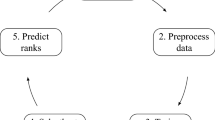Abstract
Recent research works have shown the robustness towards the recommendation system for athletics using an AI automated system that enhances the longevity of the system. With this model, the automated recommendation helps to improve the quality of athletes during the process of training or other processes. Moreover, domain experts only can understand the rationale of the recommender system where the analyzed data is stored in the cloud system. This research proposes a machine learning–based solution for an athletic dataset that automatically predicts the state of the individual with features like age, gender, calories, temperature, pressure, heart rate, pulse rate, sugar level, respiratory conditions, and state of the body. This research concentrates on modeling a framework for implementing the machine learning approaches with an optimization problem. Here, a novel extreme multi-gradient evolutionary computation (EMGEC) with improved grey wolf optimization (IGWO) is proposed to achieve exploration and exploitation during the selection of features. The dataset collected from the athletes during the marathon (running) is collected from online resources and the feature subsets are extracted from the dataset. The features of these data are analyzed and encoded before placing it over the cloud environment. The performance of the proposed machine learning approach is compared with other approaches and provides better prediction accuracy, precision, recall, and F-measure respectively. The accuracy of the anticipated model is 83.13%, precision is 91.1%, and recall is 91.3% which is substantially higher than of other approaches. The proposed model shows a better trade-off in contrast to prevailing approaches like SVM, RF, k-NN, and logistic regression.






Similar content being viewed by others
Change history
23 March 2022
A Correction to this paper has been published: https://doi.org/10.1007/s00779-022-01683-z
References
Beel J, Langer S, Genzmehr M, Gipp B, Breitinger C, Nürnberger A (October 2013) Research paper recommender system evaluation: a quantitative literature survey. In Proceedings of the International Workshop on Reproducibility and Replication in Recommender Systems Evaluation, Hong Kong, China 12:15–22
Smith B, Linden G (2017) Two decades of recommender systems at Amazon.com. IEEE Internet Comput. 21:12–18
Archana K, Saranya KG (2020) Crop Yield Prediction, Forecasting and Fertilizer Recommendation using Voting Based Ensemble Classifier. SSRG Int J Comput Sci Eng 7:1–4
Bobadilla J, Ortega F, Hernando A, Gutiérrez A (2013) Recommender systems survey Knowl Based Syst 46:109–132
Ding Z, Li X, Jiang C, Zhou M (2018) Objectives and state-of-the-art of location-based social network recommender systems. ACM Comput Surv CSUR 51:1–28
Kardan AA, Ebrahimi M (2013) A novel approach to hybrid recommendation systems based on association rules mining for content recommendation in asynchronous discussion groups. Inf Sci 219:93–110
Al-Shamri MYH (2016) User profiling approaches for demographic recommender systems. Knowl Based Syst 100:175–187
Chen Y, Wu C, Xie M, Guo X (2011) Solving the sparsity problem in recommender systems using association retrieval. J Comput 6:1896–1902
Guo G, Zhang J, Thalmann D (2014) Merging trust in collaborative filtering to alleviate data sparsity and cold start. Knowl Based Syst 57:57–68
Zhou T, Kuscsik Z, Liu J, Medo M, Wakeling JR, Zhang Y (2010) Solving the apparent diversity-accuracy dilemma of recommender systems. Proc Natl Acad Sci USA 107:4511–4515
Bortko K, Bartków P, Jankowski J, Kuras D, Sulikowski P (2019) Multi-criteria evaluation of recommending interfaces towards habituation reduction and limited negative impact on user experience. Procedia Comput Sci 159:2240–2248
Vaishnavi S, Jayanthi A, Karthik S (2013) Ranking technique to improve diversity in recommender systems. Int J Comput Appl 68:2
Rodriguez-Carrion A, Garcia-Rubio C, Campo C, Cortés-Martín A, Garcia-Lozano E, Noriega-Vivas P (2012) Study of LZ-based location prediction and its application to transportation recommender systems. Sensors 12:7496–7517
Sulikowski P, Zdziebko T (2020) Deep learning-enhanced framework for performance evaluation of a recommending interface with varied recommendation position and intensity based on eye-tracking equipment data processing. Electronics 9:266
Srifi M, Oussous A, AitLahcen A, Mouline S (2020) Recommender systems based on collaborative filtering using review texts—a survey. Information 11:317
Herlocker JL, Konstan JA, Terveen LG, Riedl JT (2004) Evaluating collaborative filtering recommender systems. ACM Trans Inf Syst TOIS 22:5–53
Gong S, Cheng G (2008) Mining user interest change for improving collaborative filtering. In Proceedings of the 2008 Second International Symposium on Intelligent Information Technology Application, Shanghai, China, 21–22 December 2008; Volume 3, pp. 24–27
Vozalis M, Margaritis KG (2004) Collaborative filtering enhanced by demographic correlation. In Proceedings of the AIAI Symposium on Professional Practice in AI, Part of the 18thWorld Computer Congress, Toulouse, France, 22–27 August 2004
Deng F (2015) Utility-based recommender systems using implicit utility and genetic algorithm. In Proceedings of the 2015 International Conference on Mechatronics, Electronic, Industrial and Control Engineering (MEIC-15), Shenyang, China, 1–3 April 2015; Atlantis Press: Amsterdam, The Netherlands, 2015.
Lillegraven TN, Wolden AC (2010) Design of a Bayesian recommender system for tourists presenting a solution to the cold-start user problem. Master’s Thesis, Norwegian University of Science and Technology, Trondheim, Norway
Haas J, Mcrrcrg N (2016) Olympic history: athletes and results data analysis, California State University, Sacramento, pp 1–6
Mirjalili S, Mirjalili SM, Lewis A (2014) Grey wolf optimizer Adv Eng Softw 69:46–61
Rodrı´guez L, Castillo O, Soria J (2016) Grey wolf optimizer with dynamic adaptation of parameters using fuzzy logic. In: 2016 IEEE congress on evolutionary computation (CEC). IEEE, pp 3116–3123
Zuo M, Gong J, Zeng Ma L, Jiao L (2015) Personalized recommendation based on evolutionary multi-objective optimization. IEEE Computational Intelligence Magazine 10(1):52–62
Zhang Q, Li H (2007) MOEA/D: a multiobjective evolutionary algorithm based on decomposition. IEEE Transactions on Evolutionary Computation 11(6):712–731
Author information
Authors and Affiliations
Corresponding author
Additional information
Publisher's note
Springer Nature remains neutral with regard to jurisdictional claims in published maps and institutional affiliations.
The original online version of this article was revised due to missing main author in reference 14.
Rights and permissions
About this article
Cite this article
Deepak, V., Anguraj, D.K. & Mantha, S.S. An efficient recommendation system for athletic performance optimization by enriched grey wolf optimization. Pers Ubiquit Comput 27, 1015–1026 (2023). https://doi.org/10.1007/s00779-022-01680-2
Received:
Accepted:
Published:
Issue Date:
DOI: https://doi.org/10.1007/s00779-022-01680-2




